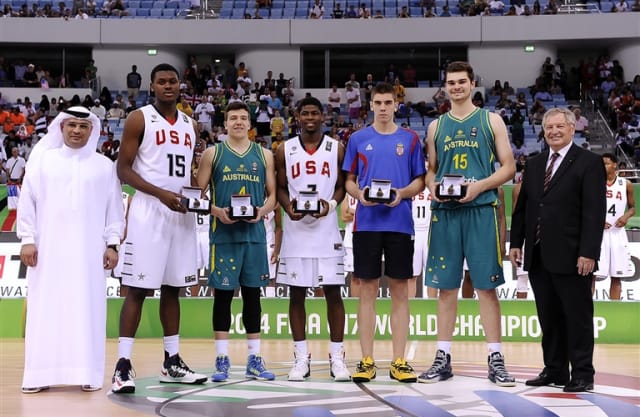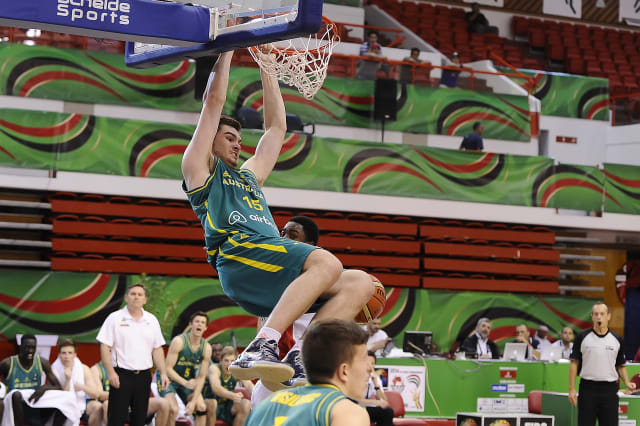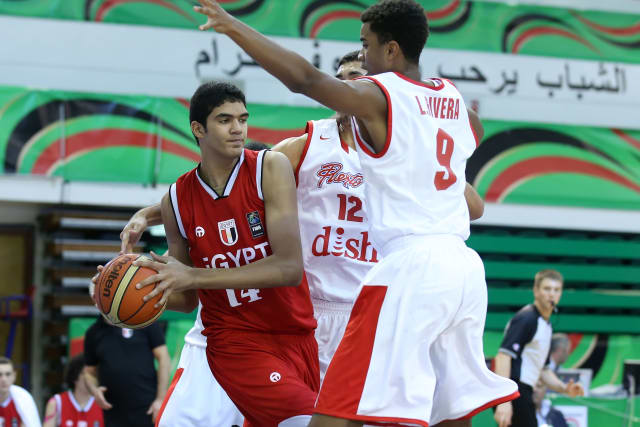The best of FIBA U17 WC 2014: Tatum, Murray, Rui, historic Khalaf and an Australian miracle
The FIBA U17 Basketball World Cup 2014 had loads of drama. It was bigger than ever with 16 teams, but the United States remained perfect. We also saw Australia with a miracle and an electric Rui Hachimura.
MIES (Switzerland) - A special aura began to build around USA after winning the first two FIBA U17 Basketball World Cups in undefeated fashion. Could anybody challenge the mighty USA?
In the end, this tournament was historic in many ways. It featured an expansion of teams from 12 to 16; drew the basketball world to the United Arab Emirates; saw the two closest games for the USA; the debut of a record holder from Egypt and a Japanese rising star going against the world.
The best team: USA
| Rank | Team | W-L |
| 1. | USA | 7-0 |
| 2. | Australia | 5-2 |
| 3. | Serbia | 6-1 |
| 4. | Spain | 3-4 |
| 5. | Puerto Rico | 6-1 |
| 6. | Canada | 4-3 |
| 7. | China | 3-4 |
| 8. | France | 3-4 |
| 9. | Italy | 5-2 |
| 10. | Argentina | 4-3 |
| 11. | Angola | 3-4 |
| 12. | Greece | 3-4 |
| 13. | Egypt | 2-5 |
| 14. | Japan | 1-6 |
| 15. | Philippines | 1-6 |
| 16. | United Arab Emirates | 0-7 |
Through the first 16 games in the first two U17 World Cups, USA had an average winning margin of 36.8 points - with the closest game being a 12-point win in their first-ever contest in the competition against Argentina in 2010. Their closest game in 2012 was also their opener - a 22-point victory against Australia.
Greece were first up for USA in Dubai and the Europeans gave the two-time reigning champs a run for their money after losing by just 10 points, 83-73. USA would cruise back into the Final - a repeat date with 2012 silver medallists Australia. And this time, Australia were ready for a battle. In the end, USA managed to secure a 99-92 win for a third straight undefeated crown. Serbia ended up beating fellow European side Spain 62-59 for the third spot on the podium.
The best video: re-watch the Final between USA and Australia
Here's the full game between USA and Australia to decide the title. Malik Newman, of course, was great with 21 points and 11 rebounds, but it's impressive to watch Jayson Tatum - a year younger than the rest of the competition - gather 15 points, 5 rebounds, 1 assist, 2 steals and 2 blocks off the bench.
The best player: Malik Newman MVP
Malik Newman took home the MVP award
Malik Newman was the Most Valuable Player as he led USA in scoring and assists. All told, Newman averaged 14.9 points, 4.9 rebounds and 3.0 assists per game as a combo guard who was stronger than most of the competition and could not be kept from driving because of his quickness. Newman had also led the USA team in scoring at the FIBA U16 Americas Championship 2013.


From left to right - Diamond Stone (USA), Dejan Vasiljevic (AUS), Newman, Nikola Rakicevic (SRB), Isaac Humphries (AUS)
Newman was joined on the All-Tournament team by teammate Diamond Stone, Dejan Vasiljevic and Isaac Humphries from runners-up Australia and Nikola Rakicevic from bronze medallists Serbia.
The best game: Australia vs Spain - Semi-Finals
Two huge teams in international basketball playing in the Semi-Finals for a date with two-time reigning champions United States in the Final - what more could you ask for? Australia made their way back to the Final, but it took a near miracle to get it done as they fought back from 22 points down to beat Spain 80-74 in overtime.
The Australians scored the final eight points in the last two minutes of regulation including two lay-ups after steals by Tom Wilson in the final 35 seconds. Isaac Humphries paced the Aussies with 22 points, 8 rebounds and 5 blocks while Wilson had 13 points and 11 rebounds. Spain shot themselves in the foot with seven of their 12 turnovers in the final 7 minutes of the game.
The best performance: Isaac Humphries - Australia vs Canada

Isaac Humphries was unstoppable for Australia in their Group Phase showdown with Canada. The big man set a new U17 World Cup scoring record as he torched the Canadians for 41 points, hitting 16-of-23 shots and 9-of-11 free throws. Humphries also grabbed 19 rebounds to go with 2 assists and 5 blocks. But the effort was for naught as Australia lost to Canada 85-74. A big reason for that was Jamal Murray collecting 25 points and 7 rebounds as he starred for Canada at the tournament.
The best scorer: Rui vs the world
Japan finished 14th in the competition with only a victory over the United Arab Emirates in the Classification 13-16, but the Asians featured one of the top players in the tournament, Rui Hachimura. The future star of the Japanese senior national team led the event in scoring at 22.6 points to go along with 6.6 rebounds, 1.3 steals and 1.7 blocks - all despite being a year younger as a 1998-born player.
Even with Hachimura, Japan finished 15th of 16 teams in scoring at 60.7 points per game. The future Los Angeles Laker accounted for 37.2 percent of his team's points. The only time he produced fewer than 25.0 percent of Japan's points was when he had 14 of 91 points - 15.4 percent - against UAE. Hachumira scored 52.9 percent of Japan's points against France (27 in 96-51 loss), 58.9 percent against Italy (35 in 83-56 defeat), and an outrageous 65.8 percent versus USA (25 in 122-38 loss). He was the only Japanese player to score more than two points against the Americans as he made 10-of-28 shots and 4-of-7 free throws to go with 4 rebounds, 2 steals, 2 blocks and just 1 turnover in 36 minutes. He was the only Japanese player who really went toe to toe with a USA team that included nine future NBA players.
The hidden star: Ahmed Khalaf - Egypt

Egypt did not stand out so much in Dubai, picking up just wins over the Philippines and Japan for a 2-5 record and 13th place. But the Africans did have one of the biggest stars in the history of the competition - 15-year-old Ahmed Khalaf. The center was fourth on the team in scoring with 8.6 points and led Egypt in rebounding at 9.3 boards per game. Khalaf grew more and more in confidence throughout the tournament, combining for 15 points, 13 rebounds, and 11 blocks in the first three games. In the fourth game against Puerto Rico he had 1 point but picked up 10 rebounds and 8 blocks.
Khalaf was a force in the last three games, averaging 14.7 points, 14.0 rebounds and 5.0 blocks. He collected 15 points, 19 rebounds and 6 blocks against Japan and had 10 points, 10 rebounds and 5 blocks against Greece and big man Georgios Papagiannis. He finished with 4.9 blocks per game - still the highest average of blocked shots in the first five U17 World Cups. The tournament was the first of four youth FIBA World Cups for Khalaf, who played again at the FIBA U17 Basketball World Cup 2016 as well as the FIBA U19 Basketball World Cup 2015 and 2017.
Stats leaders
Scorers
| Player | Points Per Game |
| Rui Hachimura | 22.6 |
| Zhao Yanhao | 21.6 |
| Isaac Humphries | 18.9 |
| Amine Noua | 18.7 |
| Hu Jinqiu | 17.4 |
| Dejan Vasiljevic | 17.4 |
Rebounds
| Player | Rebounds Per Game |
| Arnaldo Toro | 13.6 |
| Hu Jinqiu | 12.3 |
| Isaac Humphries | 11.6 |
| Bruno Fernandes | 10.6 |
| Stephane Gombauld | 10.3 |
Assists
| Player | Assists Per Game |
| Stefan Peno | 3.6 |
| Liu Chunqing | 3.3 |
| Matthew Owies | 3.1 |
| Guillermo Aliende | 3.0 |
| Malik Newman | 3.0 |
If you liked this content, please make sure to check out the reviews of previous FIBA U17 Basketball World Cups:
The best of FIBA U17 WC 2010: Beal, Poland and a number 1 NBA draft pick
The best of FIBA U17 WC 2012: Duke 2015 NCAA champs, the Exum-Simmons dream and Super Mario
[/unordered]FIBA